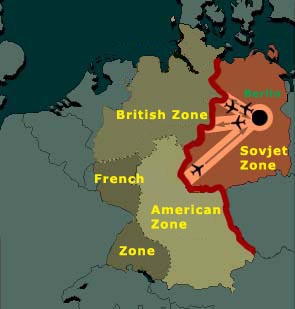Epoch III
Introduction
A new start
The first trains after the war
The first network of long-distance trains
Moving forward, more trains, more comfort, more regularity
Pre war rolling stock again in service
The start of an international long-distance network
The blue network of fast express trains
The modern era, the rise of electric locomotives
The modern diesel locomotive is coming
A new class of coaches
The third class is abandoned
The last new steam engine
A new prestious network, the Trans Europ Express
The Rheingold, from 1962 again exclusive
A new star on rails, the electric locomotive E 03
A new start
The capitulation of nazi Germany on 7 May 1945 marked the end and the beginning of a two epoches. It marked the end of a twelve years lasting regime of national socialism and it marked the beginning of a new national democratic German state.
Because of the devastating results of the war a large part of German people had literally nothing. Cities and houses were bombed, destroyed, and burned down and most of the industry and infrastructure was severly damaged.
A month after the ending of the second world war, on 5 June 1945, the so-called declaration of defeat of Germany ("Erklärung in Anbetracht der Niederlage Deutschlands") was signed in Berlin. This "Berliner Deklaration" decided that Germany as a country remained, but that Germany and Berlin were devided in four different zones. The areas in the east of the rivers the Oder and the Lausitzer Neiße were given back to Poland or came under the power of the Sovjet Union.
The American zone contained the southern part of Germany, the Britsh zone contained the northern part of Germany, the French zone contained the south-west part of Germany, and the Sovjet zone contained the former center German part which is nowadays the eastern part of Germany.
 | | This is how Germany was split up after the war in four different zones. The thick red lines represents the later so-called iron curtain. |
Each occupying power had the exclusive responsibility for the assigned zone. Each zone had a so-called "Militärgouverneur", a governor which laid down the plans and policies for the repective zone. The affairs for Germany as a whole country were arranged by the allied control counsel, which consisted of the four governors of the four occupied zones.
Because Germany was devided in four zones, the Deutsche Reichsbahn was also divided in four different railway companies. The railways were now placed under military control. Because of this, each railway company had it's own policies and plans.
On 7 July 1945 the French administration in the French zone inaugurated a new management for the Saar area, the railways of the Saar area were also falling under this new management. The railways were renamed to "Eisenbahnen des Saargebietes (EdS)" with a direction in Saarbrücken.
To discuss the new order in Europe and the future of Germany, the allied countries organised in Postdam the "Potsdamer Konferenz" from 17 July until 2 September 1945. The leaders Staling (Sovjet Union), Harry S. Truman, the successor of Roosevelt (United States) and Winston S. Churchill (United Kingdom), which was followed by Clement R. Attlee at the end of July, were meeting each other in the castle Cecilienhof near Potsdam. In the "Potsdamer Abkommen" were matters discussed as democratisation, demilitarizing, banning of nazi ideas and forbidding of cartels and decentralizing of Germany. France signed the "Potsdamer Abkommen" with reservations on 7 August 1945.
On 19 July 1945 the Reichsbahn-Oberbetriebsleitung (OBL) was founded in the American zone with a direktion in Frankfurt/Main. This OBL was the railway company in the American zone.
On 20 August 1945 the Reichsbahn-Generaldirektion der Britischen Besatzungszone (RBGD) was founded in Bielefeld, were also the direction was settling. This RBGD was the railway company in the Britsh zone.
On 20 September 1945 the allied control counsel gave the occupied forces in the different zones far-reaching permissions for the use of the railways for transporting troops, ordnance and military persons.
The French forces founded on 8 January 1946 the "Oberdirektion der Deutschen Eisenbahnen". This was the new railway company in the French occupied zone.
|
